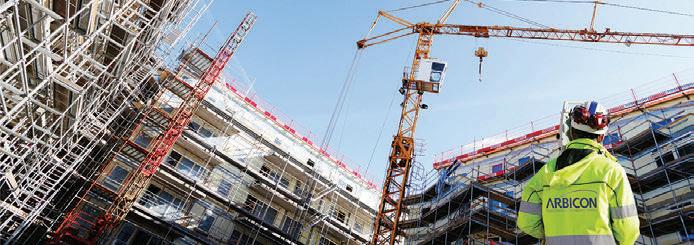
2 minute read
Ask the Expert
With material shortages and price increases currently affecting the construction industry, Arbicon warn of the importance for Contractors, Subcontractors and Building Employers to check their construction contract provisions and protect themselves against the impact of Covid-19. The Construction Leadership Council has recently warned that cement, some electrical components, timber, steel, and paints are all in short supply, citing “unprecedented levels of demand” that are set to continue “for the foreseeable future”. The present material supply problems stem from several factors, the most notable being that construction industry projects have surged since lockdown began easing, leading to a high demand for materials and price increases. As both demand and prices rise, many in the construction industry will be negatively affected. The BBC reports that
Construction Delays – Material Shortages Due to Covid-19
Advertisement
some SME builders are already struggling to purchase essential materials, like timber, cement, and roof tiles, as readily off the shelves.
WHAT CONTRACT PROVISIONS SHOULD BE CHECKED?
Clauses should be examined in existing fixed price contracts, checking any entitlement to price increases. Those parties entering new contracts should consider the inclusion of such clauses. Be aware of the current supply and pricing issues when negotiating new agreements, ensuring the prospective contract adequately captures the risk allocation between the parties, including any material related delays or cost increases. Review prospective contractual terms pertaining to delay and loss arising from material shortages or Covid-19. If not adequately captured, consider the benefit of introducing clauses that expressly set out the risk allocation for such delays and losses.
WHAT PROTECTION IS THERE AGAINST PRICE INCREASES?
Fluctuation provisions allow for prices within a construction contract to be adjusted to account for changes in the price of materials, plant, and labour, with adjustments typically made on set anniversaries and in line with inflation or published indices.
WHAT IS THE ENTITLEMENT TO AN EXTENSION OF TIME?
Check contract terms to ascertain the entitlement to additional time for delays. Where permissible, the delay, or risk of delay, should be notified as soon as possible and an extension of time applied for. A successful extension will protect against delay damages, and the contractor may also be entitled to claim for the financial loss and expense suffered. It is vital that records of both the intended cost and time, and the actual delay and costs are documented to demonstrate the delay or loss claimed was actually suffered.
HOW SHOULD A CLAIM BE NOTIFIED?
The provisions of the applicable contract form will stipulate the process of notifying a claim for time or money. Correct notification of a claim is often a condition precedent to entitlement, which can be lost completely if the notice is not served correctly and within a specified timescale. The failure to properly protect against the impact of Covid-19 and material shortages could lead to the contractor taking the risk of the delays and resultant costs, significantly impacting cash flow and financial standing. For detailed advice and assistance on your contractual rights, please contact Arbicon: 01733 233 737, advice@arbicon.co.uk, www.arbicon.co.uk











